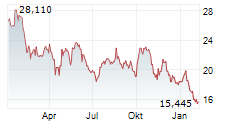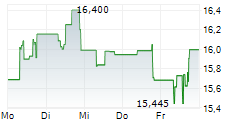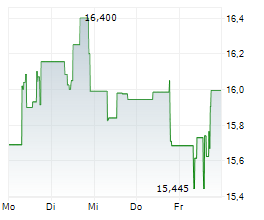
Daiichi Sankyo (TSE: 4568) and AstraZeneca (LSE/STO/Nasdaq: AZN) have voluntarily withdrawn the marketing authorization application (MAA) in the EU for datopotamab deruxtecan (Dato-DXd) for the treatment of adult patients with locally advanced or metastatic nonsquamous non-small cell lung cancer (NSCLC) based on the TROPION-Lung01 phase 3 trial.
The decision to withdraw the MAA was informed by feedback from the Committee for Medicinal Products for Human Use of the European Medicines Agency (EMA). Daiichi Sankyo and AstraZeneca will continue to work to bring datopotamab deruxtecan to patients with lung cancer in the EU who can benefit and are committed to unlocking the potential of this medicine in lung cancer through our robust clinical development program which includes seven pivotal trials in various lung cancer settings.
Datopotamab deruxtecan is a specifically engineered TROP2 directed DXd antibody drug conjugate (ADC) discovered by Daiichi Sankyo and being jointly developed by Daiichi Sankyo and AstraZeneca.
Daiichi Sankyo and AstraZeneca's application in the EU for datopotamab deruxtecan for the treatment of hormone receptor (HR) positive, HER2 negative metastatic breast cancer based on the TROPION-Breast01 phase 3 trial remains under review.
About TROPION-Lung01
TROPION-Lung01 is a global, randomized, multicenter, open-label phase 3 trial evaluating the efficacy and safety of datopotamab deruxtecan versus docetaxel in adult patients with locally advanced or metastatic NSCLC with and without actionable genomic alterations who require systemic therapy following prior treatment. Patients with actionable genomic alterations were previously treated with an approved targeted therapy and platinum-based chemotherapy. Patients without known actionable genomic alterations were previously treated, concurrently or sequentially, with platinum-based chemotherapy and a PD-1 or PD-L1 inhibitor.
The dual primary endpoints of TROPION-Lung01 are progression-free survival (PFS) as assessed by blinded independent central review (BICR) and overall survival (OS). Key secondary endpoints include investigator-assessed PFS, objective response rate, duration of response, time to response, and disease control rate as assessed by both BICR and investigator, and safety.
TROPION-Lung01 enrolled approximately 600 patients in Asia, Europe, North America, Oceania and South America. For more information visit ClinicalTrials.gov.
Primary PFS results and interim OS results from TROPION-Lung01 were presented at the 2023 ESMO (ESMO23) Congress. Final OS results were presented at IASLC 2024 World Conference on Lung Cancer hosted by the International Association for the Study of Lung Cancer (WCLC24) and simultaneously published in the Journal of Clinical Oncology in September 2024.
About Advanced Non-Small Cell Lung Cancer
Nearly 2.5 million lung cancer cases were diagnosed globally in 2022.1 In Europe, nearly 500,000 lung cancer cases were diagnosed in 2022.1 Lung cancer is broadly split into small or non-small cell lung cancer, the latter accounting for about 80% of cases.2 While immunotherapy and targeted therapies have improved outcomes in the first-line setting, most patients eventually experience disease progression and receive chemotherapy.3,4,5 For decades, chemotherapy has been the last treatment available for patients with advanced NSCLC, despite limited effectiveness and known side effects.3,4,5
TROP2 is a protein broadly expressed in the majority of NSCLC tumors.6 There is currently no TROP2 directed ADC approved for the treatment of lung cancer.7,8
About Datopotamab Deruxtecan (Dato-DXd)
Datopotamab deruxtecan (Dato-DXd) is an investigational TROP2 directed ADC. Designed using Daiichi Sankyo's proprietary DXd ADC Technology, datopotamab deruxtecan is one of six DXd ADCs in the oncology pipeline of Daiichi Sankyo, and one of the most advanced programs in AstraZeneca's ADC scientific platform. Datopotamab deruxtecan is comprised of a humanized anti-TROP2 IgG1 monoclonal antibody, developed in collaboration with Sapporo Medical University, attached to a number of topoisomerase I inhibitor payloads (an exatecan derivative, DXd) via tetrapeptide-based cleavable linkers.
Additional regulatory submissions in breast cancer are under review in China, Japan, the U.S. and other regions.
Datopotamab deruxtecan has been granted Breakthrough Therapy Designation by the U.S. Food and Drug Administration for the treatment of adult patients with locally advanced or metastatic epidermal growth factor receptor-mutated (EGFR-mutated) NSCLC with disease progression on or after treatment with an EGFR tyrosine kinase inhibitor (TKI) and platinum-based chemotherapy. Daiichi Sankyo and AstraZeneca have submitted a Biologics License Application for datopotamab deruxtecan for this potential indication.
About the Datopotamab Deruxtecan Clinical Development Program
A comprehensive global clinical development program is underway with more than 20 trials evaluating the efficacy and safety of datopotamab deruxtecan across multiple cancers, including NSCLC, triple negative breast cancer and HR positive, HER2 low or negative breast cancer. The program includes seven phase 3 trials in lung cancer and five phase 3 trials in breast cancer evaluating datopotamab deruxtecan as a monotherapy and in combination with other anticancer treatments in various settings.
About the Daiichi Sankyo and AstraZeneca Collaboration
Daiichi Sankyo and AstraZeneca entered into a global collaboration to jointly develop and commercialize ENHERTU in March 2019 and datopotamab deruxtecan in July 2020, except in Japan where Daiichi Sankyo maintains exclusive rights for each ADC. Daiichi Sankyo is responsible for the manufacturing and supply of ENHERTU and datopotamab deruxtecan.
About the ADC Portfolio of Daiichi Sankyo
The Daiichi Sankyo ADC portfolio consists of seven ADCs in clinical development crafted from two distinct ADC technology platforms discovered in-house by Daiichi Sankyo.
The ADC platform furthest in clinical development is Daiichi Sankyo's DXd ADC Technology where each ADC consists of a monoclonal antibody attached to a number of topoisomerase I inhibitor payloads (an exatecan derivative, DXd) via tetrapeptide-based cleavable linkers. The DXd ADC portfolio currently consists of ENHERTU, a HER2 directed ADC, and datopotamab deruxtecan, a TROP2 directed ADC, which are being jointly developed and commercialized globally with AstraZeneca. Patritumab deruxtecan (HER3-DXd), a HER3 directed ADC, ifinatamab deruxtecan (I-DXd), a B7-H3 directed ADC, and raludotatug deruxtecan (R-DXd), a CDH6 directed ADC, are being jointly developed and commercialized globally with Merck Co., Inc., Rahway, N.J. USA. DS-3939, a TA-MUC1 directed ADC, is being developed by Daiichi Sankyo.
The second Daiichi Sankyo ADC platform consists of a monoclonal antibody attached to a modified pyrrolobenzodiazepine (PBD) payload. DS-9606, a CLDN6 directed PBD ADC, is the first of several planned ADCs in clinical development utilizing this platform.
Datopotamab deruxtecan, ifinatamab deruxtecan, patritumab deruxtecan, raludotatug deruxtecan, DS-3939 and DS-9606 are investigational medicines that have not been approved for any indication in any country. Safety and efficacy have not been established.
About Daiichi Sankyo
Daiichi Sankyo is an innovative global healthcare company contributing to the sustainable development of society that discovers, develops and delivers new standards of care to enrich the quality of life around the world. With more than 120 years of experience, Daiichi Sankyo leverages its world-class science and technology to create new modalities and innovative medicines for people with cancer, cardiovascular and other diseases with high unmet medical need. For more information, please visit www.daiichisankyo.com
_______________________________
References
1 World Health Organization. Global Cancer Observatory: Lung. Accessed December 2024.
2 American Cancer Society. Key Statistics for Lung Cancer. Accessed December 2024.
3 Chen R, et al. J Hematol Oncol. 2020:13(1):58.
4 Majeed U, et al. J Hematol Oncol. 2021;14(1):108.
5 Pircher A, et al. Anticancer Research. 2020;70(5):287-294.
6 Mito R, et al. Pathol Int. 2020;70(5):287-294.
7 American Cancer Society. Targeted Drug Therapy for Non-Small Cell Lung Cancer. Accessed December 2024.
8 Rodríguez-Abreau D, et al. Ann Onc. 2021 Jul;32(7): 881-895.
View source version on businesswire.com: https://www.businesswire.com/news/home/20241220836560/en/
Contacts:
Media Contacts
Global/US:
Jennifer Brennan
Daiichi Sankyo, Inc.
jennifer.brennan@daiichisankyo.com
+1 908 900 3183 (mobile)
EU:
Natalia Juncal Strandt
Daiichi Sankyo Europe GmbH
natalia.juncalstrandt@daiichisankyo.com
+49 (151) 16817622 (mobile)
Japan:
Daiichi Sankyo Co., Ltd.
DS-PR@daiichisankyo.co.jp
Investor Relations Contact:
DaiichiSankyoIR_jp@daiichisankyo.com





